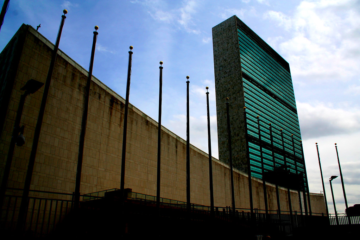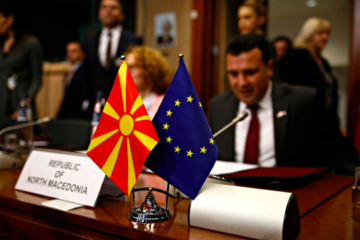Currently in Brussels, reform heralds significant changes for the European Union, but it is also in the East that the winds of change herald the reshaping of Europe. The 2004 economic and political pivot, in which eight former Soviet-bloc countries were admitted to the European Union, as well as the impact of Brexit means that increasingly its future lies in Central and Eastern Europe. Particularly the Visegrad Group, a cultural and political alliance between Poland, Hungary, the Czech Republic and Slovakia will have an important role to play. They are commonly seen as a cabal of dissidents within the EU, with characters like Hungary’s Prime Minister Viktor Orbán playing as a nemesis to European integration. However, a closer look reveals that all four countries, located at the geographic heart of Europe, can play a distinctive role in promoting integration as they are growing in economic importance, with Poland being the only European country to avoid recession in the last 25 years. For the future of Europe, one should hence look to Prague as well as Paris, and Budapest as well as Berlin.
A constant theme in the news of the so-called Visegrad Four (V4) focusses on attempts to frustrate European policy, such as the group’s persistent refusal to implement obligatory migrant quotas. However, this portrays an undeserved vision of the region, when it is the type of cooperation, rather than its fundamental existence which is the source of most discord. Both in its original Bratislava declaration and its reaffirmation in 2011 the goals of advancing military, cultural, economic and energy cooperation as well as furthering integration in the EU were asserted. In ECFR polling, when asked “In the EU, who should mainly be responsible for the integrated foreign and security policy?”, respondents from the Netherlands, Belgium, and Ireland all wanted higher levels of national sovereignty than the V4. It is only in questions concerning immigration and asylum policy where there is a significant deviation from most EU countries. Hence, it is more accurate to see the Visegrad countries as opposed primarily to some forms of integration, rather than rejecting reforms out of principle.

Indeed, the V4 has also had a positive impact on EU policy by enhancing the political influence of their respective members within Europe and abroad. Although each is vital to Europe’s financial edifice, with all being in Germany’s top 20 importers, their individual political influence in Brussels would hardly merit this economic power. Informal groupings like the V4 allow the magnification of the views which can be lost amongst the intricacy of each of the 27 individual member states’ negotiations in Brussels. Just as Macron discussed with Merkel before developing his proposals for a eurozone budget, the development of other policy coalitions can also act for the positive development of the EU. Networks like the Visegrad Group are an additional rather than opposing systems, as participation does not exclude other partnerships like the ‘Austerlitz format’ between the Czech Republic, Slovakia and Austria started in 2015.
The Visegrad Group countries are vital for the EU’s future politics and foreign policy in Eastern Europe. All four members have set an important precedent and laid a path in their post-Soviet period of transition in the development of the rule of law, freedoms and a competitive market economy. Any potential future enlargement to the EU will occur in Eastern or Southeastern Europe, with the Deep and Comprehensive Free Trade Area and the Eastern Partnership being seen as a precursor to full membership. Here, the Visegrad Four’s own experiences of transitioning to EU membership from shared historical and cultural backgrounds could prove essential in ensuring a successful adjustment for new members. This regional cooperation is also furthered by the International Visegrad Fund, an organisation providing grants for the development of civil society and cross-border cooperation. It has provided €61 million in grants since its creation, not only to its own members, but also the Western Balkans and Eastern Partnership regions like Ukraine, Moldova or Georgia. On balance, this would seem to support EU ideals of cooperation and integration, rather than undermining them.
However, while it is clear that Central and Eastern Europe will shape the future of the EU, their ideas may well diverge from others. Previous proposals of a “multi-speed Europe” have been sharply rebuked, with the V4’s declaration “Strong Europe – Union of Action and Trust” rejecting paradigms like “more” or “less” Europe in favour of a “better” Europe. Greater cooperation, the protection and development of the freedoms of the Single Market and the Energy Union are all endorsed by the group. However, it is clear to all that Viktor Orban, his party Fidesz and the ruling PiS in Poland are not ardent supporters of Brussels, seen in disputes over Poland’s judicial reforms and the European Parliament triggering article 7 as it accuses Orban of undermining the rule of law in Hungary. Unsurprisingly, in a history often dominated by political relations with Berlin or Moscow, the V4 seek fiercely to protect their independence and political power. Their vision of Europe stresses its Christian, traditional and national roots. If ignored within the framework of the European Union, these conflicting visions could generate irreparable damage, with the V4 as a real faction of dissidents, rather than just an occasional critic. Perhaps this then underlines one of the most critical complexities of past and future European relations, in forming a consensus from diverse perspectives.
As the European Union redefines itself after Brexit, it may well be in the V4 where it can find the answers to its future. More than merely a clique of rebels, they play an essential role in the economic and political life of Europe and have been intimately involved in foreign policy questions on Eastern Europe and its relationship with the bloc. Undoubtedly, the V4 can be one of Europe’s future focal points. If its political priorities are combined with plans of reform in the European Union, the region can become more than just the geographical heartland of Europe, but also a staunch defender of its values. Nevertheless, a Visegrad Group whose opinions are relegated to the fringes of the European project could cause enormous destabilisation. Acknowledging the historical and cultural importance of the Visegrad Group, as well as its current and future political significance would do much to strengthen the unity of the European project, and prompt new attitudes to the world’s conception of Central and Eastern Europe.


